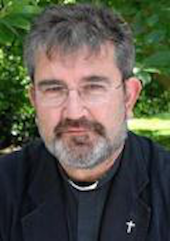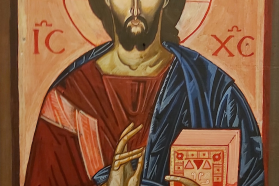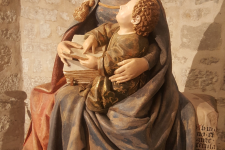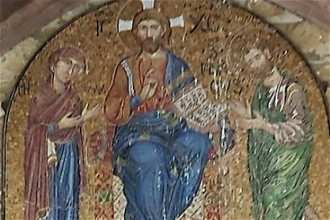Sunday Reflection with Fr Robin Gibbons - 3 January 2021

Fr Robin Gibbons
Second Sunday after Christmas..
As we turn into the first few days of the New Year, reflection on what has been will still be in our minds, hope for the future too, but if you are like me those thoughts will have limitations. We simply don't know how long this Pandemic will cast a shadow over our lives, instinctively we recognise this virus of a far more serious type than many of us have ever faced, and the longer it carries on the more removed will we be from the past that existed before it began. How many times have you heard this phrase; "when we get back to normal!.
Perhaps the liturgical cycle of Nativity feasts this time round, really do help us to dig under the surface of a faith challenged in ways we never thought possible. How many of us equate the strictures of Covid-19 with the themes of uncertainty, unknown trouble, death and conflict found throughout the story of Jesus' birth and growth? I have begun to and one strong word keeps appearing in my mind, a simple one, 'limitations'. The wonderful story of the Incarnation heard today in those theologically rich and poetic words of John's Gospel sound strong, forceful, like a clarion call: "In the beginning was the Word!'(Jn I), but that shifts, we focus on John the Baptiser who came, called by God, to be a witness to that light. Immediately there is a sense of limitation. The great hints and promises of the `Messiah to come, very much as some of us treat the life of Jesus, are seen as something outside our normal experience, power, glory, signs, miracles attend this coming, this life.
But that is not the whole story, these words pull us back to a more grounded reality: "The true light that gives light to everyone was coming into the world. He was in the world, and though the world was made through him, the world did not recognize him. He came to that which was his own, but his own did not receive him".(Jn 1:9-11) The point is that even the Most High, the Holy One beyond all knowing, has to let the Word, that true Light who is incarnate in Jesus of Nazareth fit into our lives, live in the finite dimensions of existence on earth. The Incarnation does not take away harsh life, it illuminates and blesses it, it draws us closer to the unknown God, but it does all that from the place we are at.
So, what can we take from this Sunday's readings? Simple things, we like John are the way Jesus will be known, we have to become witnesses so that those who do not know him sense him through our faith no matter how poor we think it to be! John tells us, and we believe it that is true: 'The Word became flesh and made his dwelling among us. We have seen his glory, the glory of the one and only Son, who came from the Father, full of grace and truth." (Jn 1: 14) Simplicity is the hallmark of Jesus, he entrusts himself to us, because the Incarnation is God pitching his tent in the fields, gardens, homes, towns and cities of Earth, becoming as the smallest, so in us that light may grow and the darkness be overcome. That is our miracle, we can reach God because God is already with us, but in our turn we have to hand on the light, keep that flame of love alight and burning bright. May the Jesus who loves us help us so to do it!
Lectio Divina
Poem
John
by Malcolm Guite
This is the gospel of the primal light,
The first beginning, and the fruitful end,
The soaring glory of an eagle's flight,
The quiet touch of a beloved friend.
This is the gospel of our transformation,
Water to wine and grain to living bread,
Blindness to sight and sorrow to elation,
And Lazarus himself back from the dead!
This is the gospel of all inner meaning,
The heart of heaven opened to the earth,
A gentle friend on Jesus' bosom leaning,
And Nicodemus offered a new birth.
No need to search the heavens high above,
Come close with John, and feel the pulse of Love.
Thomas Merton
No Man is an Island
"The beginning of love is the will to let those we love be perfectly themselves, the resolution not to twist them to fit our own image. If in loving them we do not love what they are, but only their potential likeness to ourselves, then we do not love them: we only love the reflection of ourselves we find in them"


















